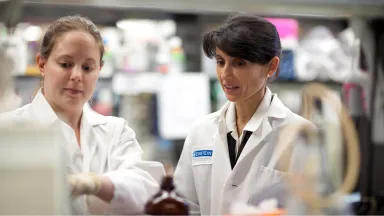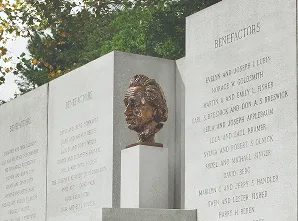
Eugen Dhimolea, Ph.D.
- Assistant Professor, Department of Molecular Pharmacology
Area of research
- Cancer biology, treatment-persistent cancer cell states, tumor microenvironment, tumor cell dormancy, adaptive drug-resistance mechanisms in cancer cells, 3D cultures/organoids, immunotherapies in cancer
Phone
Location
- Albert Einstein College of Medicine Jack and Pearl Resnick Campus 1300 Morris Park Avenue Forchheimer Building 248 Bronx, NY 10461
Research Profiles
Professional Interests
Our laboratory is interested on the cell-autonomous and microenvironmental mechanisms of tumor cell treatment persistence/resistance.
1) Despite the advances in cancer treatment, administered therapeutics often fail to eradicate the tumor cells in patients. One key focus area for our lab is the biology of the tumor cells that persist (residual tumor) after the initial acute cytotoxic effect of treatment and represent a reservoir for the eventual relapse. The goal of our research program is to functionally dissect the cancer cell state transitions that enable their persistence to multiple treatments and prevent the curative outcome. Our previous work has demonstrated that post-treatment residual cancer cells evade drug-induced cytotoxicity by adopting a distinct cellular state of reversible dormancy. This molecular program in persistent cancer cells resembles the adaptive diapause in epiblast stem cells, a dormant stage of suspended development in pre-implantation embryos triggered by stress and associated with suppressed Myc activity and overall biosynthesis. We aim to identify the molecular mechanisms that allow the tumor cells to enter, survive during and exit this diapause-like dormant state. We are also interested on the molecular similarities and unifying principles across treatment-induced adaptive dormancy and other survival states of quiescence in nature, such as the paused pluripotency during embryonic development. To this end, we combine the use of versatile in vitro (e.g. 3D monotypic and heterotypic organoid cultures) and in vivo (subcutaneous, orthotopic, or patient-derived xenografts) cancer models with molecular and functional studies.
2) Tumor cells reside in a complex 3-dimensional tissue microenvironment and interact with other, non-malignant, cell types (e.g. mesenchymal, immune cells etc.) and with extracellular matrix (ECM) molecules. Our previous work has focused on the reciprocal cross play between tumor cells and stromal cells as well as the ECM remodeling within the tissue microenvironment. We have observed that the interactions between tumor cells and the surrounding stroma (non-malignant cells and ECM) can profoundly affect the sensitivity of tumor cells to various classes of therapeutics (e.g. hormonal agents in breast and prostate cancer). Our current work focuses on dissecting the molecular interactions between tumor cells and the other elements of the microenvironment in the context of cancer therapy. Our goal is to increase the efficacy of pharmacological and immune therapies through manipulation of the tumor microenvironment.
Selected Publications
Recent selected publications:
· Dhimolea E*, de Matos Simoes R, Kansara D, Al'Khafaji A, Bouyssou J, Weng X, Sharma S, Raja J, Awate P, Shirasaki R, Tang H, Glassner BJ, Liu Z, Gao D, Bryan J, Bender S, Roth J, Scheffer M, Jeselsohn R, Gray NS, Georgakoudi I, Vazquez F, Tsherniak A, Chen Y, Welm A, Duy C, Melnick A, Bartholdy B, Brown M, Culhane AC, Mitsiades CS*. An Embryonic Diapause-like Adaptation with Suppressed Myc Activity Enables Tumor Treatment Persistence. Cancer Cell. 2021 Feb 8;39(2):240-256. [corresponding authors]
· Dhimolea E*, de Matos Simoes R, Kansara D, Weng X, Sharma S, Awate P, Liu Z, Gao D, Mitsiades N, Schwab JH, Chen Y, Jeselsohn R, Culhane AC, Brown M, Georgakoudi I, Mitsiades CS*. Pleiotropic Mechanisms Drive Endocrine Resistance in the Three-Dimensional Bone Microenvironment. Cancer Res. 2021 Jan 15;81(2):371-383. [corresponding authors]





